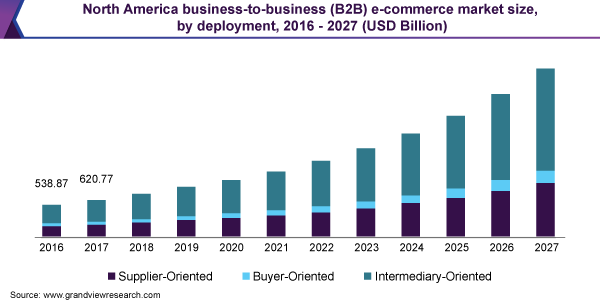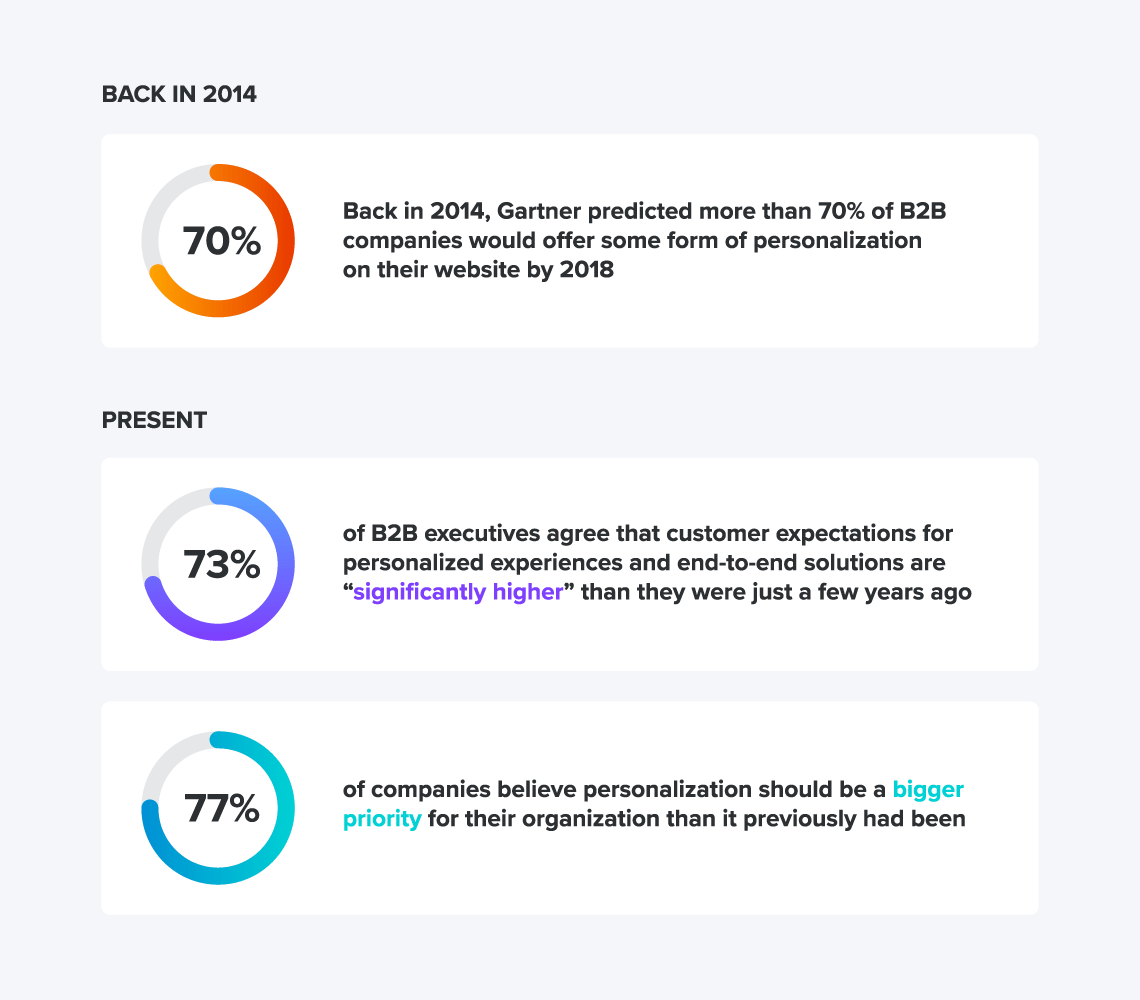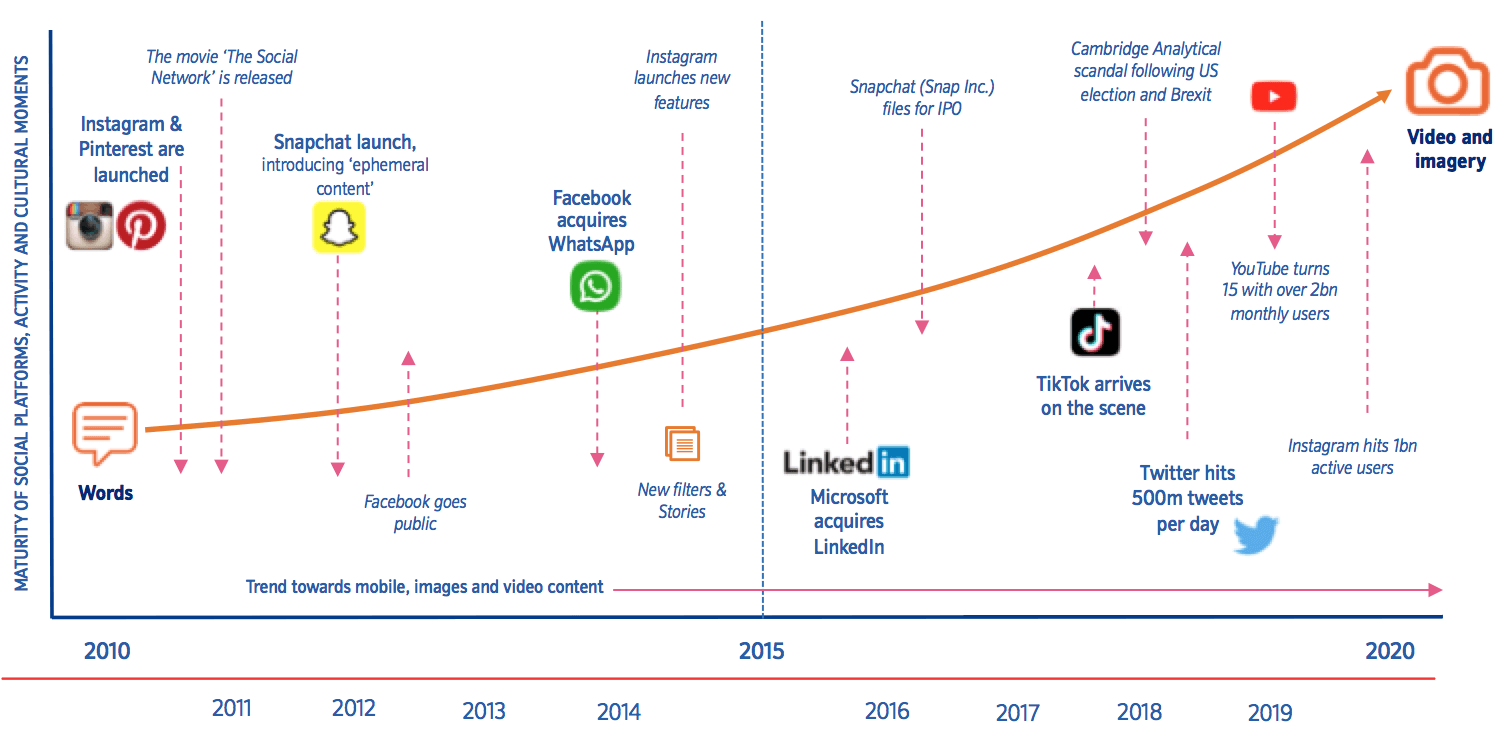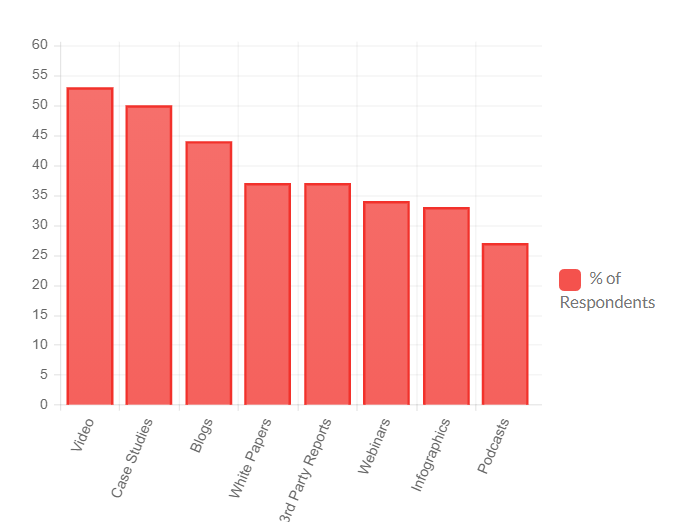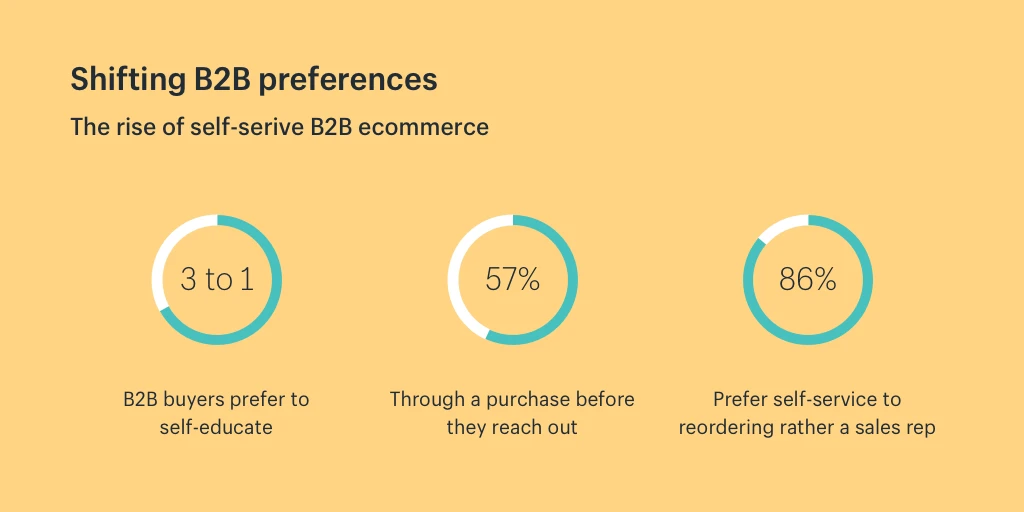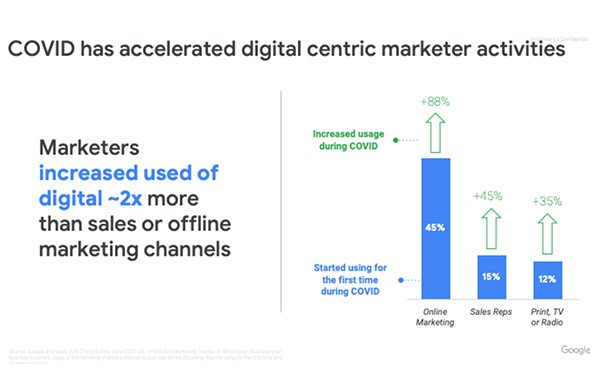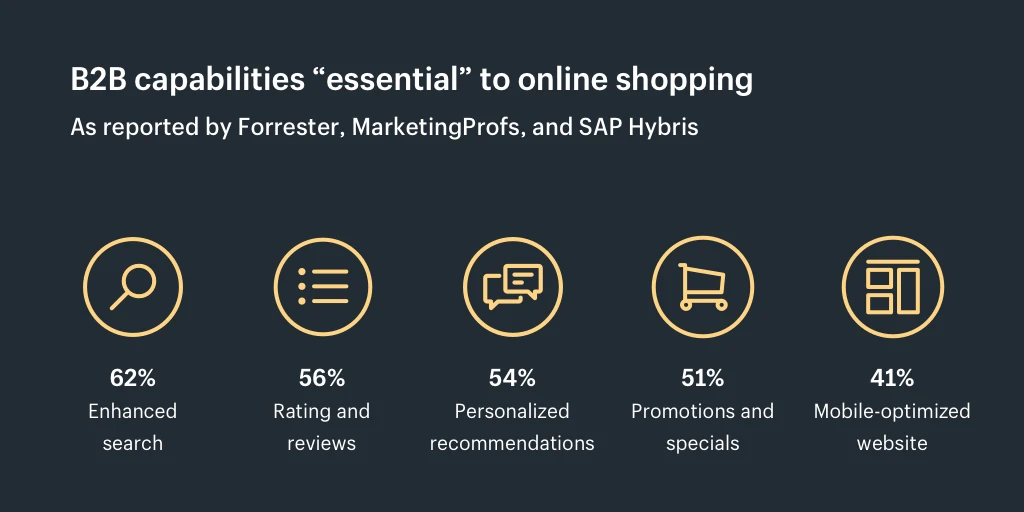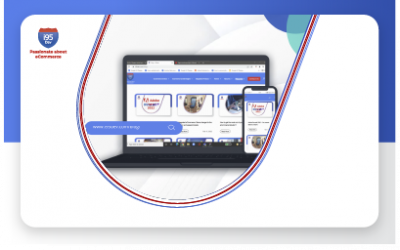Top 4 B2B eCommerce Trends That Will
Help Boost Your Revenue In 2021
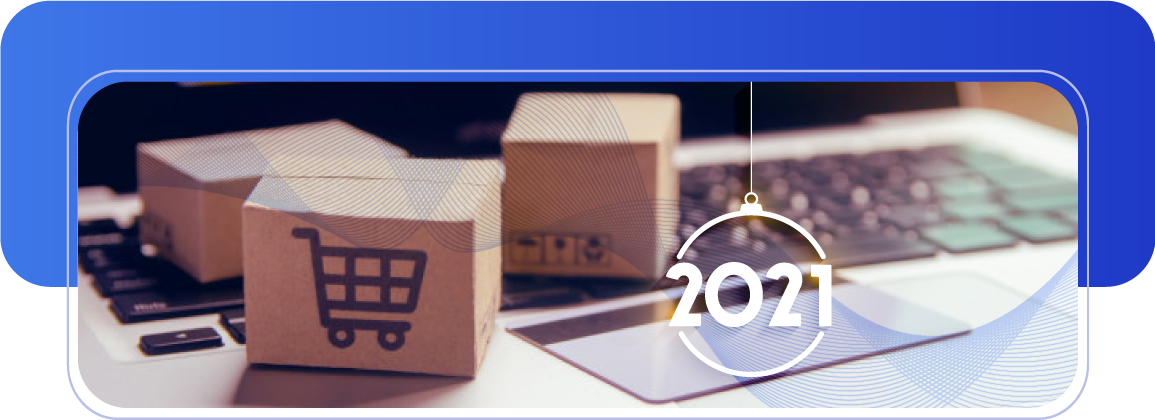
When it comes to adopting eCommerce trends, B2B brands have been a bit slower than B2C ones, but the market perception is evolving rapidly. In fact, a report finds that by 2023, B2B eCommerce is expected to hit $1.8 trillion in the US alone. Entering digital marketing for growing your eCommerce business and various online commerce spaces is the need of the hour as the demographics are changing rapidly. Even targeting the 73% of millennials participating in B2B purchases is becoming an outdated strategy. Gen Z, which forms 32% of the global population, already has USD 143 billion worth of purchasing power.
The pandemic has only accelerated the pace at which manufacturers, vendors, and suppliers are adopting eCommerce. Today, we are going to look at the top four b2b eCommerce trends for 2021 that will help boost your revenue. Read the blog ahead to know more about the trends that you can harness to improve your B2B eCommerce store’s profitability.
( Image Credits )
#1 Clients Are Consuming More And More Content Before Purchasing
One of the biggest differences between a B2C and a B2B client is the fact that the latter does a lot more research before buying. The reason is simple: B2B purchases have lasting effects on organizations, and they directly impact bottom lines. Before making a purchase, 9 out of 10 people read online reviews. Before buying, over 47% of the people read 3 to 5 blogs. This makes it clear that having exhaustive content in multiple formats can help you attract more leads and build authority.
( Image Credits )
The best way to approach this trend is to create stackable content. It refers to creating multiple small pieces of content and stacking them to create a master resource. Also, you can repackage those content pieces for different platforms and methods of consumption to target as many leads as possible. Becoming a thought leader can be a game-changer for you since the B2B consumer behavior is rapidly imitating B2C.
( Image Credits )
#2 B2B Clients Are Seeking Social Commerce Integration
( Image Credits )
One of the impacts of changing customer demographics is the shift towards social media as a place for learning about new products and services as well as making purchases from over there. For instance, LinkedIn Ads are gaining traction with their refined leads generated from their uber professional user base. Similarly, you have to include the platform-specific content distribution in your strategy because each of them appeals to a specific consumption method.
Videos are among the best ways to communicate your message over social media because the user doesn’t need to invest much effort into understanding. As a result, videos are becoming increasingly crucial, with over 53% of B2B buyers finding them as the most useful content form:
( Image Credits )
If you aren’t already using social commerce, it is high time to get started with it as it is the most popular content marketing strategy as found by a survey:
( Image Credits )
However, you will need to hire eCommerce integration experts to ensure that your social commerce transactions are connected with your eCommerce store. This simplifies order processing, customer relationship management, and billing in the case of service-based products.
#3 B2B Buyers Want Self Service Portals
One of the outcomes of the stay-at-home lifestyle for B2B buyers is their increasing affinity towards self-servicing. Interacting with a conversation chatbot can help them learn about different aspects of your business at the place and time of their convenience. Also, this allows you to reduce the costs while providing 24/7 availability for your prospects. It shows how the differences between a B2B and B2C store are slowly decreasing. The below infographic explains the shift in B2B self-servicing preferences:
( Image Credits )
As an eCommerce store, providing self-service options can help you address concerns such as complex site navigation, product discovery, pre-sales data collection, and order processing. All of these coincide with the client preferences, and hence you will also significantly improve the digital experience on your eCommerce store.
#4 Digital Payment Options Are Becoming A Must For B2B Transactions
( Image Credits )
Another emerging B2B eCommerce trend is the increasing demand for digital payment options. A large part of the customer journey has turned digital, B2B buyers will have to implement support for digital wallets like Stripe, Amazon Pay, and Apple Pay. Especially, the companies selling SaaS products and other IT solutions will need to reconsider the online payment options they are currently providing and add new methods as suitable for their target base. More than half ( 52.2% ) of global eCommerce payment transactions in 2023 will be made using mobile and digital wallets. You can see how this trend is picking pace for different payment options.
. ( Image Credits )
Summing Up
( Image Credits )
As we dive deeper into 2021, the B2B eCommerce landscape will change faster than before, given the fact that economies will start moving towards normalcy. There are many trends like AI adoption, AR/VR for business, headless eCommerce , and the API-first development strategy, but we have focused on the trends that you can easily use to boost your bottom line.
Notably, all of these trends revolve around refining customer experience and the customer journey at large. This is also reflected in the above infographic as we see B2B eCommerce turning more customer-centric. If you are looking for B2B eCommerce integration experts, i95Dev is the ideal vendor. You can mail us at info@i95dev.com or call directly on 301.760.7499. You could also fill in your details , and our team will reach out to you.
Recent Blogs
Enhancing Shipping Precision with Custom Shipping Groups in Adobe Commerce/ Magento
Enhancing Shipping Precision with Custom Shipping Groups in Adobe Commerce/ Magento Author Category Share Three things matter the most when it comes to eCommerce shipping: speed, accuracy,...
Managing Massive Product Catalogs: Why Synchronization is the Key to Efficiency
Managing Massive Product Catalogs: Why Synchronization is the Key to Efficiency Author Category Share The automotive aftermarket industry is vast and highly competitive, requiring businesses...
A Complete Guide to Seamlessly Integrating Adobe Commerce with NetSuite
A Complete Guide to Seamlessly Integrating Adobe Commerce with NetSuite Author Category Share Integrating Adobe Commerce (formerly Magento) with NetSuite ERP can transform the way businesses...



